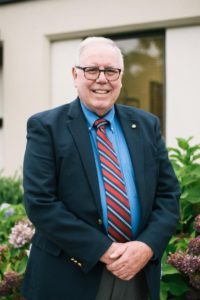How It All Started: The Story of Executive Director, Thomas C. Riley
When Thomas Riley began his career in the early seventies, he never imagined that someday he would be leading a top service agency for persons with disabilities. “I never woke up one day and said I wanted to be an Executive Director… It was something that just evolved naturally,” he says.
However, in 1988, Riley had a vision for a service model and support system that the community needed. Today, that vision exists as Better Community Living, Inc., and in 2018, the agency will proudly celebrate 30 years of service – from providing 19 community-based homes to individuals with disabilities, to varying day habilitation programs, children’s programs, faith programs, employment programs, and more.
Earning a degree in Public Administration, Riley started out studying the development of mental health programming. He was working in the psychiatric ward of a hospital running small group therapy programs. “I had a knack for that, working with people,” he says. “I was running one of the first mental health day programs in the area.”
However, Riley didn’t just excel at working with people. He found a natural empathy, understanding, and compassion for those requiring a unique, often challenging, level of care. This led him to eventually work with individuals with disabilities. The time was during the Reagan presidency, and government funding had just been cut. Most of the traditional institutions that individuals with developmental disabilities were being served by were being closed. As a result, residential and community-based services started to evolve. “I ended up working with another agency, understanding how to start a group home and get it licensed,” Riley says, remarking that the results were significant. “You could see how the quality of life improved for people who started initially in large state institutions then came to live in smaller homes in the communities.”
Riley saw a need and an opportunity in his own community, and BCL was born with a unique goal to serve the person, to offer them a life similar to anyone’s, and to use new positive behavioral approaches for lasting skills development. “I used a lot of the ideas of community-based services that I’d learned, and I knew it was important to have services that were offered locally and still nearby individuals’ families,” he says.
Riley began with what he felt was critically important – providing persons with a place to call home. “It was providing a chance for individuals to move into a regular household, a household like my own, or anyone else I knew, a three or four bedroom ranch” Riley says. “They could then learn to use community services, go to a regular dentist, doctors, and banks. For people that lived in the state institution, they were never exposed to these things.”
The institutional setting not only limited a person’s exposure to the outside world, but it also removed an individual’s ability to live autonomously, to develop independence, ownership, or a sense of self. Washing of laundry in the institutional setting was always an issue. It’s that simple act of moving into a house, and the laundry stays in that house. They get their own clothes. It’s that natural flow of life that is a huge benefit to people.”
Riley also wanted to position the agency directly in the community, to work more closely with families and provide more opportunities for real relationship building. “I wanted to make the agency compact geographically. The reason was to maintain quality and connection with the people we were serving. Communication with families is very important, and I wanted to make sure we had input from the families and consumers all the way to the top level of the agency,” Riley says.
BCL thus started with residential programs and day programs. The first home contained four individuals. Then, more homes were acquired. “We started to set up duplexes because a 2-person household felt more natural than a 4-person household. It also provided more dignity and privacy… For example, people with autism have some really unique needs. They respond best to a quiet household,” Riley says. “We’ve also had people who stay home. For some, the day program is too much stimulation. It’s not an appropriate place for them to go. We provide services for them and things to do out of a house where they are more comfortable and more at ease. The behavioral challenges we may see in other environments we don’t see by doing it this way.”
Within just two years, BCL was serving 20 individuals in five different households. Riley secured committed, long-term staff that were dedicated to BCL’s new consumers and its mission. “The consumers were new to the households, and staff were new to the consumers. From being in the institutions, many individuals had learned some very difficult behaviors. We trained our staff to use positive behavioral supports and these behaviors – behaviors, like self-abuse – stopped. Other agencies would restrain, but we used positive behavioral support interventions, using restraints as a short-term, last resort.”
Today, BCL offers 19 homes to a range of 45-50 individuals, along with its numerous other programs such as Day Habilitation, Individual Supports, Children’s Services, Bridges to Faith, Shared Living, and its Supported Employment Network.
“Our agency had a focus – that we stand by the people we are serving. We chose to change the environment using positive behavioral supports. It’s about common sense and treating people with respect and dignity… and this paid off for people who had challenges. Once they learned to feel comfortable again, their challenges subsided,” Riley says.
Today, Riley has countless stories to share. “I think of the people we started with in this agency. Once we were able to establish a place they felt comfortable, safe, and secure… a lot of the challenging issues they had in their life went away. They developed new skills that were critical to obtain a better quality of life,” he says. “For some, it may take time. It may take a couple of years. Eventually, you see their comfort level, communication skills, relationships improve… That, I think, is the rewarding part of the work, to see people gain so much more control over the quality of their life.”
Riley shares a story of one individual who came to the agency without the ability to speak. “We worked with him on his communication skills. Now, 10 years later, he has good communication skills. He can control his environment, build relationships,…and he’s happy. He’s happy and comfortable, and that’s really important of the people we serve in residential programs,” Riley says. Another story describes a woman who had multiple children, who needed residential services. “She visited various agencies and picked ours. We worked with her, helped pick out the house they were going to live in, and helped them move in. Before that, they’d been at a state institution for 30 years…”
What BCL has provided has been life-changing for persons with disabilities and their families. Families were, and continue to be, thrilled by their loved ones’ improvements and results. Often, a person’s successes and breakthroughs have been accomplishments that many thought impossible. “It’s about serving the person,” Riley says. “It’s about understanding them, and doing things in a way that is positive, that reinforces their skills, and that serves their needs.”
“We keep the individual’s interests, the families’ interests, and our interests shared. We’ve made it a community for everyone – and it’s made our agency what it is today.”
Friendships, Art, and Lifelong Memories: The Story of David and Gregory
In life, people meet under all kinds of circumstances. Often, these circumstances are expected. We make new friends in our social and work networks and we don’t think twice about it. Other times, however, a new connection seems to come out of nowhere. It’s the person you meet standing in line for coffee, the person you accidentally collide with on the street – or the person you meet one day while casually exercising at the gym. This is the story of David and Gregory.
The year was 1997. Gregory Yurovitsky was working out at the gym like any other day when a young man appeared to ask him a question. Within minutes, Gregory found himself talking naturally and easily with David Danis. They became fast acquaintances and friends as Gregory gave David tips and pointers on exercising and working out.
David’s mother recognized the connection that her son had with Gregory, and asked Gregory if he would be willing to guide and mentor her son more closely through his service agency, Better Community Living Inc. (BCL). Gregory said “sure” and he’s been helping to support David ever since. Twenty years later, Gregory has served as David’s mentor, friend, and even his roommate. When David needed a place to live at one point, Gregory opened his doors to him.
Gregory speaks highly of David’s persistence and work ethic. “When you tell David about something, he wants to do it. You can say it may be hard, and he says ‘I love it!’ He doesn’t even care,” Gregory says. “David’s willing to try. He works hard and succeeds every time.”
Gregory’s right… David’s work ethic is impressive. Having recently turned 50, David’s energy and dedication hasn’t ceased. To this day, he works four different jobs including Home Depot for 15 years, Olive Garden for 17 years, Big Value Outlet for 7 years, and Friendly Pizza for 20 years. “Everybody likes David,” Gregory says. “He gets recognition. By now he’s a pro, one of the best workers.”
However, Gregory is known for something else – his art. One day, Gregory noticed that David was always coloring in coloring books. “It was meditation for David,” Gregory says. Then one day, David had a stack of books. As he was flipping through the pages he said, “Gregory I want to show you something.” Gregory looked but David persisted, pointing at the pages. “Yes David, I’m looking,” Gregory said. “No look…,” David replied. “He was painting in small dots,” Gregory recalled, “and when you stepped away, you could see a whole picture. I couldn’t believe it. I said, this is art.”
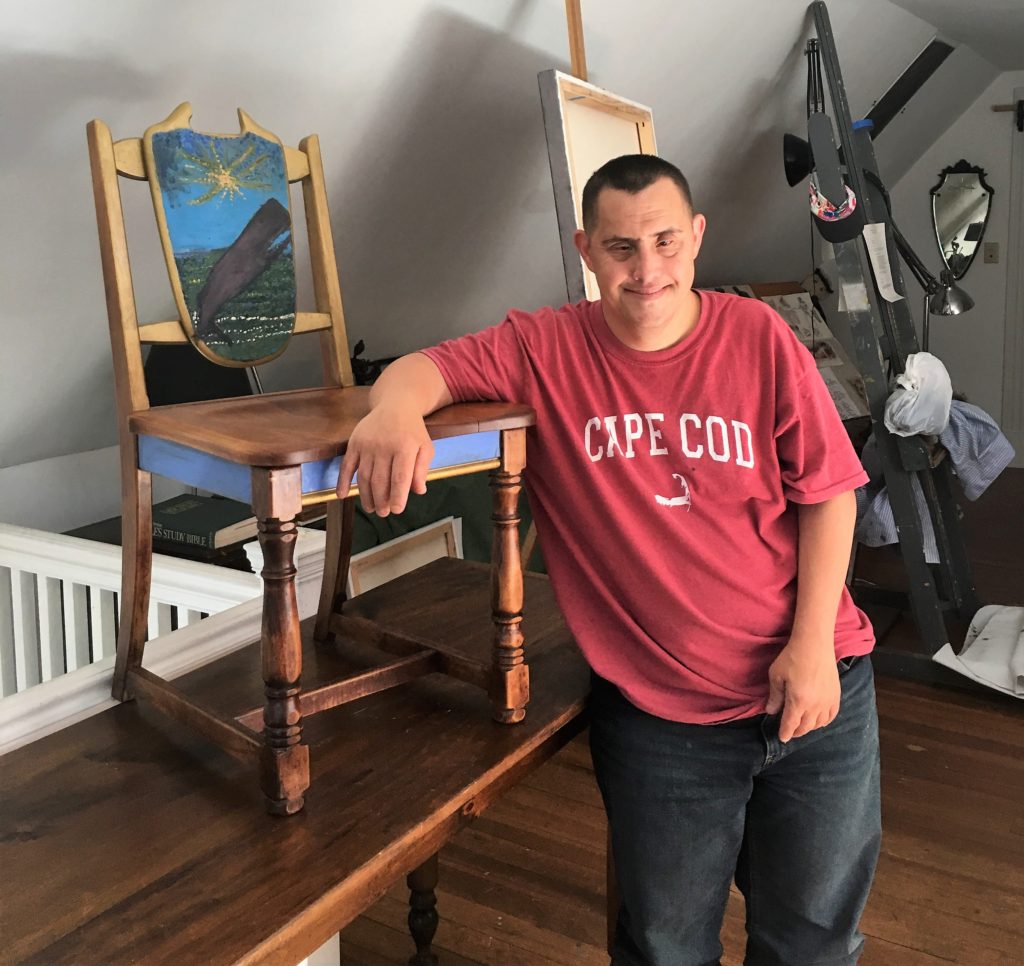
David repurposed and painted a chair he spotted on the side of the road!
With the help of Gregory and his mother, David began practicing his craft. He met an art teacher at UMass Dartmouth and started receiving lessons from art students. Then, David’s mother found a local artist to assist as David’s art teacher and mentor. Today, David’s art can be found throughout the community. His paintings appear in businesses, like doctors’ and lawyers’ offices, and even in places he has worked. One painting hung inside Olive Garden for two years, and others hung inside the Hampton Inn where he also once worked. He’s received recognition too. One local Senator requested a painting for his office, and shortly thereafter honored David at the State House for his accomplishments.
“He took his own direction in art. It’s abstract. They call him Monet with Down syndrome,” Gregory says. “He participated in so many art shows and exhibitions, and we also sometimes do auctions as fundraisers.”
For twenty years, Gregory has been one of David’s greatest advocates. He not only supports David’s interests, but sees his potential on a daily basis. Gregory’s role has been instrumental to helping David lead a rich and fulfilling life.
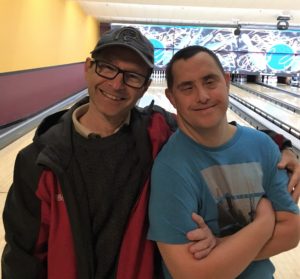
Today, Gregory and David still exercise at the gym together. “He’s very active. David likes to workout. He also likes to take long walks on the beach or in the park. We always have our phone or camera. When David sees something he likes, we take a picture, and we send it to his art teacher, and he paints it – local river, fields, or birds, or anything he likes,” Gregory says. “He likes bowling too,” Gregory says, “and he’s really good at bowling. He used to be in the Special Olympics. He likes to play tennis too, and he always beats me because he’s so good. Right David?” David smiles. Further, the two have even traveled together all the way to Israel. David has family there, so both of them planned a trip and visited for two weeks to celebrate Passover together with David’s family.
Gregory says Better Community Living has played an important role in David’s life, and that he has been extremely grateful for the opportunity to help. He says, “It’s very rewarding. I’ve learned a lot from David… Not to get discouraged, and try to do the best you can in everything, and in your life. Nothing should hold you back. I can see some people get depressed with disabilities and I think it’s the wrong approach. David is proof of it. He’s so successful in everything he does. His limitations are nothing. It’s not an obstacle for David.”
To support Better Community Living, Inc. and contribute to individuals like David, consider a small donation. BCL serves children and adults with disabilities. People like you help make our services available. To make a secure donation online, visit www.bettercommunity.com.
BCL Establishes Internal Employee Wellness Program
Better Community Living, Inc. (BCL) is proud to announce its participation in the Massachusetts Working on Wellness project – an initiative aimed at establishing an internal wellness program for employees. Funded by the MA Prevention and Wellness Trust Fund, the project is overseen by the MA Department of Public Health. BCL received $10,000 seed funding and will match 50%, bringing the total to $15,000.
An on-line Needs and Interest Survey distributed to BCL staff helped to identify employee wellness interests, as well as common health risk factors. This information helped formulate the basis of the program, which has been successfully launched and implemented by BCL’s new Wellness Committee. The program includes educating employees on how to make healthier food choices, while providing access to resources that support heathy eating. Further, employees have been provided opportunities to become more physically active through community programs, gym memberships, and company-sponsored events. Potential work stress factors were also reviewed and programs were developed to address diminishing those factors to foster less stress among employees.
Daryl Lopes, fulfilling the role of the grant-required Champion of the new BCL Wellness Committee, says this grant has been especially beneficial to BCL employees. “There needs to be a wellness component to an employee’s life to have success and reach many of the goals we set. You have to be mentally attuned and physically ready to care for individuals that can’t always necessarily say what they need. That can make it hard and stressful,” Lopes says.
Lopes charges a committee of colleagues who serve to establish goals and objectives, and organize programming in line with the grant’s purpose. One of the first initiatives under the grant was the agency’s first ever Wellness Fair. The public event advanced awareness and offered information to both staff and the community on local wellness resources.
Staff are also actively involved in a Wellness Competition, which uses a points-based system, paired with incentives and prizes for making healthy choices. “Staff earn points by tracking their fruits and vegetables, their water intake, by checking into the gym, for every 15 minutes of activity, for attending wellness meetings, and points for turning in their tracking sheet,” stated Lopes. Employees win prizes when they reach certain milestones, with large prizes available at the end of the challenge. In just its second week, numerous staff had already reached their first tier goal.
To further support and serve its staff, BCL has hosted free cooking classes, a free Zumba class, and guidance on using the Fitness Pal app and keeping a weekly food journal.
“Healthier employees are happier employees. They’re out less, and they take time off for vacation more than for sick days. We’re hoping to have success with this program, make it sustainable, and make people aware of what they can do to improve their health,” Lopes says.
Further, wellness can address some of the challenges that BCL employees face on a daily basis. “Stress, poor eating habits, if you’re not in decent shape… its easy to run your body down. If you had a child or loved one with a disability, just like caring for aging parent, there is a stress level that goes with it. You want to provide them with the best possible care, but that takes effort,” says Lopes.
The committee is therefore determined to encourage its employees. “We’re really hoping that employees will take notice of what we’re doing. We notify them through our employee website, implemented email for all staff members to keep them in the loop, and hopefully soon we will have a Facebook page specifically for BCL wellness to get and keep them engaged.” He added, “For me personally, it’s good competition. I’m already down 20lbs.”
Workplace wellness is a growing movement to support a company’s employees, foster an environment of health and well eing, and also serve as an added perk for any prospective future employee seeking to work for a company that supports his/her health. BCL intends to continue the program for the long-term, to pro-actively support the wellbeing of its employees.
Featured on ABC6 News! Poker Run to Benefit Better Community Living
Check out our recent fundraiser! Better Community Living was honored to be the recipient of funds raised in the 4th Annual Nopper Marine Poker Run! This “boat race” raised monies to support BCL’s Children’s Services which serve children with intellectual and/or developmental disabilities throughout Southeastern, Massachusetts. In addition to Nopper Marine as the primary organizer and sponsor, additional contributing sponsors included Earl’s Marina and Down the Hatch.
The 4th Annual Nopper Marine Poker Run
The 4th Annual Nopper Marine Poker Run to benefit the children’s program and supported individuals at Better Community Living, Inc. Better Community Living, Inc. from Down the Hatch Down the Hatch was featured on ABC6 News Nice! #getthedrift Heidi Pereira
Posted by The Drift Buzzard’s Bay on Monday, September 11, 2017
The event took place on Saturday, September 9th. Boaters raced from Earl’s Marina, to Woods Hole, Quicks Hole, the Chart Room Kingman Marine, and then back to Earl’s Marina to celebrate.
BCL is a premier, not-for-profit human services agency dedicated to providing person-centered services to adults and children with intellectual and developmental disabilities in the Greater New Bedford area. Programs include Bridges to Faith, Children’s Services, Day Habilitation, Individual Supports, Residential Living, Shared Living, and Supported Employment.
The Poker Run suppotred BCL Children’s Services, which provide support to individuals ages 3-22 and their families. The purpose of these programs is to maintain the family unit and avoid the out-of-home placement of a child. Programs emphasize positive behavioral supports for youth with unique needs to help them develop skills, reach their unique goals, and achieve their fullest potential. Diverse supports are provided directly by program staff, or via referrals to partner resources in the community. These help meet individuals’ needs in varying areas that include medical, social, educational, housing and transportation. Families also receive direct quality supports to help them navigate the daily responsibilities and requirements of caring for a child with a disability.
To make a donation to our Children’s Programs, please reach out to us via email, or donate online.
Bridges to Faith Offers Religious Inclusion for Persons with Disabilities
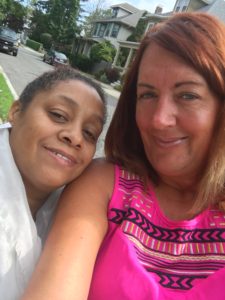
Bridges to Faith coordinator Heather Dextradeur was honored to speak at the Ruderman Foundation interfaith meeting on June 26th, before a full room of clergy members and representatives from all major religious groups. The meeting, held at Northeastern University in Boston, served to educate attendees about community resources that facilitate faith-based social inclusion.
Founded in 1995, the Bridges to Faith program has found tremendous success uniting individuals with disabilities with the faith community. The program pairs persons with willing members of local congregations who wish to offer support as Faith Companions. Faith Companions arrange for the individual to fully participate in the life of the congregation. For the individual, this offers an opportunity to have not only their spiritual needs met, but it also provides a sense of belonging, friendship and value not easily obtained. Further, it also helps to enrich the lives of the congregations who welcome them.
Heather presented the goals, values, and successes of the program, specifically as she has witnessed it in her role as Coordinator for the last three years. Joining her was Sharon Costa, a participant of Bridges to Faith, whose moving story helped demonstrate the true impact of the program.
“When I first met Sharon, she was living with a Shared Living Provider in Fall River. She was referred to me through Bridges to Faith to help her meet her spiritual needs. Like most referrals, I received a packet of need-to-know information, such as medications, allergies, a list of doctors and basic history. The piece that often seems to be missing is the information that makes a person who they are. When I met Sharon, there were two things she wanted to be sure I knew. One, she was of Cape Verdean descent and two, she was a Christian. She also felt it was important for me to know how proud she was that she had a Bible and read it every night. Soon after that, I discovered that Sharon could not read but I understood how significant it was for her to look at the pages and the strength that it gave to her.
“Sharon then informed me that she was attending a Portuguese Catholic Church with her caregiver every Sunday. Although she was not Catholic, nor did she speak or understand Portuguese, she stated, “it is better than nothing.” Sharon was hungry for God and wanted the experience of faith, God and church so much that she was willing to settle and attend a service she didn’t understand and that was not her faith. I immediately found a faith companion who began taking Sharon to a local catholic church in the Fall River Community. Sharon seemed to enjoy this new church and would often go out to eat with her volunteer. She met the volunteer’s family and was even invited to a Bruins game. Sharon seemed to enjoy the church and it became a Sunday ritual. I always had it in the back of my mind that Sharon’s true faith is Christian and she was hoping for a more inclusive role in her church.
“Due to medical issues with her caregiver, Sharon was transferred to a new Shared Living home in New Bedford. Sharon had lived in various homes through multiple agencies for the past ten years. Now residing in New Bedford, Sharon inquired about a New Bedford area church where she attended a Bridges to Faith Christmas event. Sharon said she enjoyed the church very much because it had lively Christian music, singing, dancing and she recognized many of the members as there was a large Cape Verdean population. She said she “knew them when she lived with her parents.” Sharon began to attend the new church and the agency helped to support the change. Her respite provider would drive twenty minutes each way to bring her each Sunday. The Program Manager would also provide transportation as this became the highlight of Sharon’s week.
“Sharon developed many natural friendships at church and before long she met a new friend Christina. Christina not only became her Faith Companion, she became so much more. Christina was an active member of the church. She was part of the choir, the coordinator of events and missions for the church, and leader of Woman’s Group. Sharon wanted to participate in religious activities offered by the church and not just attend Sunday Service. Sharon asked if Christina could take her to Bible study and Christina agreed. Sharon started to go to Bible study every Thursday. The pastor would often have someone read the verses out loud as he understood that Sharon could not read. When I asked Sharon how she was reading the Bible every night, she explained she was holding it and looking at it. “God made the words clear for me,” she replied.
“The next thing Sharon wanted to do at her church was become part of the choir. The church took their choir very seriously and only the most devoted church members were allowed to even audition. Sharon was DETERMINED to be on the choir. She asked if she could attend the practice as she knew that would be the only way she could learn the dances and the words to the songs. Christina picked up Sharon every Wednesday to attend choir practice. For six months, Sharon NEVER missed a practice. Any time there was a new song, Christina would ‘YouTube’ the song for Sharon so she could learn the words as she knew she could not read. Sharon practiced day and night listening to the videos. The day had come where Sharon became an official member of the choir. Sharon extended an invitation to all she knew to watch her sing on stage for the first time. Sharon filled the church with all her friends she invited to see her sing. It is a very small church and the pastor joked that he would invite his friends and family but Sharon seemed to have a gift, as she was able to pack the chairs.
“Sharon now has a new family. This is not a “paid family.” It is not paid staff support, but people who embrace her for who she is. Sharon attends all the parties, cook out and birthday parties. Sharon has never missed a Sunday, a Bible study or choir practice. She rang in the New Year attending a party on New Year’s Eve with all her new friends. Sharon no longer has to say, “I want you to know I am a Christian.” She has forever marked her identity, made her religious preferences known, paved her own way and she is a Christian.”
Meeting attendees welcomed Sharon’s story with great affection and full appreciation for the continued success of the Bridges to Faith program. It’s mission of social inclusion in the faith community is a central piece of effectively serving persons with disabilities across all facets of life. Further, Heather also discussed her efforts to consistently put social inclusion at the forefront of the program’s mission. In addition to its already large network of partners and opportunities, Heather discussed various recent expansions. This includes a new partnership with North Baptist Church, and the hosting of a monthly pot luck and movie night. Several program participants also volunteer weekly at a local soup kitchen, while others help to host coat drives for the homeless. Actions such as these, according to Heather, have opened the door for natural friendships and inclusion in the community.
To learn more about the Bridges to Faith program, click here.
Shared Living: Friendship, Family, and Quality of Life
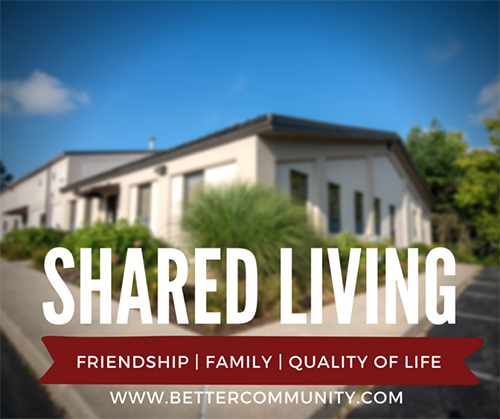 At Better Community Living, Inc. (BCL), great emphasis is placed on offering integration, independence, and relationship building to adults with intellectual and developmental disabilities. All of these are central to helping these individuals lead fulfilling lives. While BCL is known for providing homes to its consumers, the agency also offers another valuable option – Shared Living.
At Better Community Living, Inc. (BCL), great emphasis is placed on offering integration, independence, and relationship building to adults with intellectual and developmental disabilities. All of these are central to helping these individuals lead fulfilling lives. While BCL is known for providing homes to its consumers, the agency also offers another valuable option – Shared Living.
Shared Living engages families and individuals to fully open their homes to BCL consumers. These providers then support an individual’s daily living skills, and help them to fulfill their personal goals.
Individuals are welcomed into the home as a member of the family. They are fully integrated into daily routines and the family’s social life. They attend events together, help run errands, participate in meal planning, shopping, and prep as much as they are able to do so. Providers also help the individuals to engage better in community and social activities, develop self-sufficiency, and build strong relationships, as well as assist with transportation and medical appointments.
Further, the individual who lives with a provider has great autonomy and independence. They’ll have their own bedroom with a bed and bureau, a dresser for their clothes, and a lock on their door. They have a right to invite family/friends over to visit. With the assistance of their provider, they attend events and participate in outings of their choice – and even plan out vacations! Overall, shared living aims to help BCL consumers achieve greater quality of life.
BCL’s Placement Services Director visits a potential provider’s homes to learn more about them, know their personality, inspect the home, and determine if their house qualifies. The best possible provider is someone who has the physical space, as well as the time and availability to provide quality companionship and support.
If selected, Shared Living Providers then receive training and a memorandum of understanding. By the time their individual moves in they’ll be fully trained in first aid, CPR, home safety, how to deal with intellectually disabled persons, and how to be an effective provider to reach certain goals. Providers will also understand medication, money plans and money management, and how to approach ISP’s.
An ISP, or Individual Support Plan, outlines each individual’s unique goals. One of BCL’s existing Shared Living Providers says, “My guy’s goal is to interact with friends and interact in the community. Another thing is that he likes photography, so one of the goals is to build a collage and set up a place for his pictures.”
This is exactly what Shared Living is all about. It’s about supporting a person’s interests, and helping them to further their goals. It’s also about skills development and enhancing one’s social abilities and comfort. Many, over time, come out of their shell. They become more trusting. They become more open to trying new things, meeting new people, and at the same time, they learn more about who they are and what they enjoy.
Shared Living Providers are Independent Contractors through BCL and receive a monthly stipend, which is tax free as allowable by law. As an added support, Providers also weekly support if they cannot help with an individual’s transportation, and they also receive two weeks of respite per year. Learn more at www.bettercommunity.com.
To learn more about the Shared Living Program, contact Tenina Ramos at 508-999-4300 Ext. 220 or tenina_ramos@nullbettercommunity.com.
March is National Developmental Disabilities Awareness Month!
March is National Developmental Disabilities Awareness Month! We’re proud to honor those we serve and to celebrate the work that we do. Take a look at some of our hopes and goals, and the events we have planned throughout the month!
BCL HOPES AND GOALS FOR MARCH
- To highlight the value offered to our communities by persons with developmental disabilities
- To demonstrate how these individuals come together to form strong and diverse communities
- To raise awareness of persons with disabilities and reduce stigma and stereotypes
- To raise awareness of Better Community Living’s resources and support services
- To engage all in embracing this population of individuals as members of the community
HAPPENINGS & EVENTS
- March 1, 8, 15, 22, 29 – NYACause
- Not Your Average Joe’s, 61 State Road, Dartmouth, MA 02747
- 11am-10pm, dine-in or takeout, Wednesdays all day, 15% of bill will benefit BCL
- March 12 – BCL, Disabilities Awareness, and Caregiver Self-Care Day at NB Well Sundays
- NB Boys and Girls Club, 166 Jenney Street, New Bedford, MA 02740
- Free, collaborative event with the New Bedford Wellness Initiative
- 10:30am Qigong and 11am fitness class
- 12pm awareness “walk” and rally in the gym with food and prizes
- 1pm all-levels yoga
- 1pm suicide prevention training with Rev. David Lima
- 2pm mindfulness guided group meditation
- chair massages, SouthCoast Health Van, a hypnotist, and more!
- March 17 – Access Dance
- VFW Poirier Post, corner of Ashley Boulevard and Appleton Street
- Open to the public, 7pm – 10pm, DJ, snacks and soda, $10 entry
- St. Patrick’s Day themed – wear your green!
- March 22 – 99 Dining for a Cause
- Pub 99 Restaurant, 34 Sconticut Neck Road, Fairhaven, MA 02719
- 4pm-9pm, dine-in or takeout, 15% of bill will benefit BCL
- Bookmark distribution
- Bookmarks will be distributed to every area library with information that supports disabilities awareness and provides a link to Better Community Living’s website
Supported Employment Network Provides Meaningful Work and Loyal Employees
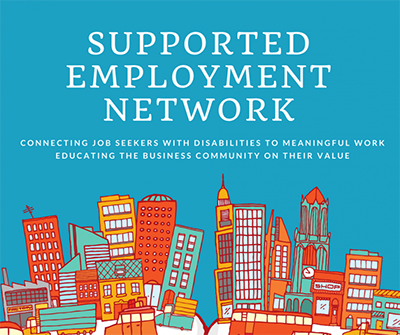 The mission and purpose behind Better Community Living is to provide opportunities that support independence for adults with disabilities. In order to fully accomplish this mission, BCL emphasizes the importance of integrating skilled individuals into the workforce.
The mission and purpose behind Better Community Living is to provide opportunities that support independence for adults with disabilities. In order to fully accomplish this mission, BCL emphasizes the importance of integrating skilled individuals into the workforce.
For more than 20 years, Better Community Living has collaborated with the New Bedford Area Chamber of Commerce to provide work opportunities through its “Supported Employment Network.” The program bridges a connection between chamber members and job seekers with disabilities who wish to secure employment.
The program has found tremendous success, assisting hundreds of skilled adults with disabilities to obtain meaningful employment. In addition, the program has achieved great strides by simply educating the business community on the benefits of hiring a person with disabilities.
Joanne Rego, Coordinator of the employment program, assists BCL consumers, as well as others served by Lifestream, M.O.Life, and the Department of Developmental Services.
“My role is to link the Chamber membership with the agencies, and to try to inspire businesses to hire an individual with developmental disabilities. Part of that process is we have an article in every Chamber Focus newsletter. We either highlight an individual who’s looking for employment, or someone who has been successfully employed.”
When asked about the benefits she communicates, Joanne says, “I let them know we have a very skilled and eager workforce that is looking to be a valuable employee to businesses. Individuals with disabilities receive top job support and job development training.”
“They’re eager, very loyal, and we don’t have a high turnover. A lot of times they’ll work in positions that typically do have a high turnover, whether it’s packing in a supermarket or working in a fast food restaurant, or general maintenance. Many will stay for 20 years… so employers aren’t constantly training and retraining for a particular job.”
Joanne says that the program provides incredible value to the individuals it serves. “For the same reasons that you and I want to have a rewarding job,” she says, “There’s a feeling of self-worth… and everyone likes a little money in their pocket.”
Many jobs also fulfill the individual dreams and wishes of BCL consumers. “There’s one lady with BCL that said she always wanted to work in a bakery, in a restaurant, and she’s doing that… which is exactly what she wanted. She wanted to be in food service.”
Not only has the Supported Employment Network impacted individual lives, it has made a major impact locally, nationally, and even globally. Over the years, the program has received widespread recognition and has even been used as a model program for other locations.
The development of a video highlighting successful job placements titled, Supported Employment: Make it Work For You, was shown at the ADA’s 10th Anniversary Celebration resulting in the Network receiving an Outstanding Program Award. In addition, the program was reviewed by the National Technical Assistance and Research (NTAR) Leadership Center to which it was then listed as a “STAR” program and utilized as a case model in the U.S. Department of Labor’s Handbook on hiring employees with disabilities.
The Network was also highlighted in an issue of the United States Chamber of Commerce’s newsletter, and a collage of photos in the New Bedford Chamber of Commerce’s newsletter highlighted 46 employees with disabilities that had been employed for five years or more.
The Supported Employment Network Program also had the opportunity to provide a presentation to Rotary members who were visiting New Bedford from Russia. The visiting Rotarians were so impressed with the Supported Employment: Make it Work for You video that they requested to use it in Russia during seminars in the larger cities in Russia, including Moscow, St. Petersburg and Novosibirsk.
To learn more, contact Joanne Rego, Supported Employment Network Coordinator, at 508-999-5231, ext. 28 or email jrego@nullnewbedfordchamber.com
Childrens Programs Provide Families the Tools to Succeed
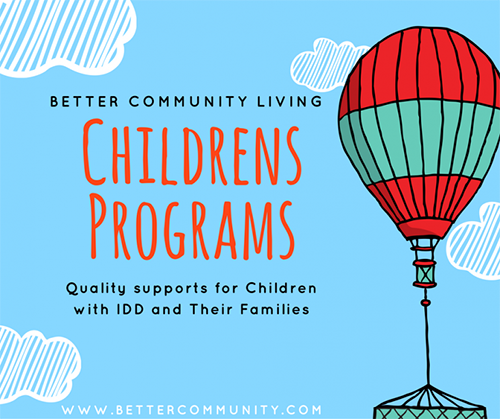 The mission of Better Community Living is to support and enhance the lives of those with developmental and intellectual disabilities. Though known for its quality services for adults, Better Community Living serves the unique needs of children with disabilities, and their families as well.
The mission of Better Community Living is to support and enhance the lives of those with developmental and intellectual disabilities. Though known for its quality services for adults, Better Community Living serves the unique needs of children with disabilities, and their families as well.
The Children’s Program at BCL provides support to individuals ages 3-22, who are at home living with their families. The goal is to assist the family to maintain the family unit and avoid the out-of-home placement of a child. Several programs are offered, ranging in services from advocacy and support, to direct in-home assistance, and recreational programs. Supports are also catered to meet each individuals’ needs in areas that include medical, social, educational, housing and transportation.
Cathy Tremblay, Coordinator for the Children’s Program, has devoted 11 years to BCL, and says she particularly enjoys her work with children and families. She cites the many successes across all three programs offered, helping youth to grow and develop and helping families during challenging processes, changes, and new experiences.
One program, Intensive Family Flexible Support (IFFS), provides direct family outreach and home visits on a weekly basis, typically for a short amount of time ranging between 6-12 months. During this time, Cathy works with families who may be in crisis, those who may have multiple children with disabilities, or those who simply struggle with the challenges of a child with limitations and/or challenges.
“It can include referrals, PCS services, maybe the family needs Mass Health… Children with IDD qualify for all those services,” says Cathy, who then assists the families with obtaining access to anything they need. She visits weekly, then bi-weekly, and then monthly, until the family is able to continue and support their child without further help.
An additional program offered to children and families by BCL is their DESE/DDS Program. Families served in this program, unlike the IFFS program, receive support for an unlimited amount of time. In fact, the ages range from 6-22, and individuals remain in the program until they are 22 years old.
“We provide family navigation, different supports and assistance, and we provide staffing 6-8 hours per week, focusing on goals, providing ABA services…” says Cathy. Visits are monthly and parents are able to play a role in who is staffed to assist the family and the child. “Parents have a say in who is hired,” Cathy says. She will then also assist these families with guardianship, DDS eligibility and application processes (especially when individuals must reapply at age 18), and any needs pertaining to MassHealth, food stamps, and housing. The program also focuses on each individual’s IEP (Individualized Education Program).
The third, and perhaps most fun program offered to children by BCL is their Children’s Recreation Program – a collaborative initiative with the Arc of Bristol County. The program is held on Friday evenings right at BCL, offering everything from dance to gymnastics, tae kwon do, and more.
BCL also utilizes their Day Hab room two Fridays per month for their “Friends Nights” where 20-30 consumers will get dropped off, ranging in age from 3-26. “Parents will say, my kids have real friends now… It’s opportunities that they wouldn’t have been able to find without these facilitations,” says Cathy. “Parents also connect with each other. They are isolated so often. The entire evening really comes together nicely.”
Cathy truly is a wealth of information on area resources and offerings for these families. She notes that even the local AMC Dartmouth Mall offers monthly sensory-friendly films. Child and family-friendly movies occur on the 2nd Saturday of every month, and films for adults are offered on the 2nd Tuesday of month. These sensory-friendly movie nights cater to the needs of those who have various disabilities, including welcoming those who need to get up and move around mid-film.
Since facilitating the Children’s Programs Cathy says, “We’ve had a lot of successes.” Starting in the field 21 years ago, Cathy began working with adults with ADD and helping them with job development. She then started working with families, and then in family support. This, she says, is rewarding and defines what she loves about her work.
“I really enjoy working with families and giving them the tools to succeed and grow… best part of my job. Even though I start off helping, it’s getting them to continue that on their own… Giving them the tools and putting all those pieces together.”
Better Community Living’s Children’s Program serves individuals from Dartmouth to Wareham. The program helps children and young adults with any type of intellectual disability, including autism. For more information, call 508-999-4300 or email cathy_tremblay@nullbettercommunity.com.
BCL’s Executive Director, Thomas C. Riley says “Thank You” to the Seaport Inn and Marina
 On behalf of Better Community Living, Inc. (BCL) and our Board of Directors, I would like to extend a heartfelt “Thank You” to Bob Contreras and his staff at the Seaport Inn and Marina located in Fairhaven, MA for their continued support and commitment to BCL and the individuals we serve.
On behalf of Better Community Living, Inc. (BCL) and our Board of Directors, I would like to extend a heartfelt “Thank You” to Bob Contreras and his staff at the Seaport Inn and Marina located in Fairhaven, MA for their continued support and commitment to BCL and the individuals we serve.
Since 2009, Bob has generously donated the use of the Grand Ballroom, one of their function spaces, at the Seaport Inn and Marina and provided a delicious dinner for over 125 people for BCL’s Annual Holiday Dinner and Dance that is held each December. Bob and his staff are warm and welcoming making everyone feel as if they were invited into their homes for these Holiday Dinner Celebrations. This gift is priceless and a sign of the true spirit of Christmas giving.
Bob keeps the Spirit of Christmas alive throughout the year offering rooms for shelter when emergencies arise that effect individuals served by BCL. Whether it is a power loss or heat loss at one of our homes the staff at the Seaport Inn have warmly accommodated us usually with very short notice.
Better Community Living is dedicated to supporting and serving individuals with developmental disabilities in the Greater New Bedford area as they strive to develop relationships and greater independence in the community. Bob and his staff are dedicated to supporting BCL. Again, thank you Bob for the kindness, generosity and time and effort that you and your staff put into our Annual Holiday Dinner and Dance; it means the world to us!
